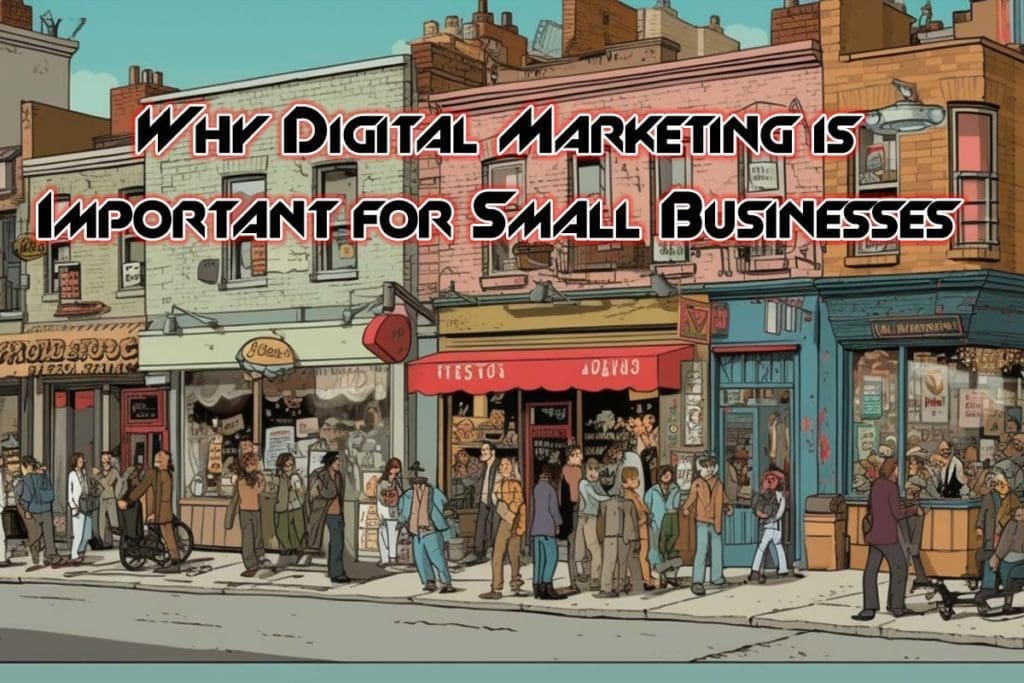The Reasons Why Digital Marketing is Important for Small Businesses
Key Takeaways:
- Digital marketing offers small businesses a cost-effective and measurable way to reach a global audience. It allows you to interact with prospects, target the right audience, and communicate at every stage of the buying process, ultimately increasing brand awareness and sales.
- Popular methods for small business internet marketing include SEO, affiliate marketing, PPC, inbound marketing, content marketing, email marketing, and social media. These methods complement traditional marketing actions and empower customers to do business on their terms.
- Building trust and brand reputation is crucial for small businesses. Utilizing Google My Business, providing authentic customer service and sharing testimonials, encouraging customers to share positive reviews on social media, and utilizing tools such as Google reviews and LinkedIn recommendations can increase brand reputation and customer loyalty.
 Digital marketing is key for small businesses aiming to become successful online. It helps them reach more people and promote their products and services, raising their revenue.
Digital marketing is key for small businesses aiming to become successful online. It helps them reach more people and promote their products and services, raising their revenue.
One advantage of digital marketing is that it allows small businesses to accurately target their audience. Tactics like SEO, social media, and email marketing help them connect with the right people at the right time, leading to higher conversion rates.
They can also track their performance and make decisions based on the data they get from their campaigns. This leads to better ROI and more efficient use of their marketing resources.
It’s clear that more small businesses are recognizing the importance of online marketing. A report by Clutch showed that 71% of them spent more on digital marketing in 2021, confirming its role in small business success.
Importance of Digital Marketing for Small Businesses
Small businesses must leverage the power of digital marketing to stay ahead of the game. In this section, we explore why digital marketing is important for small businesses and how it can help reach a larger and more global audience in a cost-effective and measurable way. We also discuss how digital marketing provides the ability to interact with prospects, target the right audience, and communicate at every stage of the buying process, all while saving money and tracking responses.

Global Audience in a Cost-Effective and Measurable Way
Reach a Larger, Global Audience in a Cost-Effective and Measurable Way
Digital marketing is a cost-effective way for small businesses to reach a global audience. It helps them communicate with potential customers through every buying stage without using expensive traditional ads.
A great benefit is tracking responses from prospects. This lets businesses optimize campaigns and boost sales.
Popular digital marketing methods are SEO, affiliate marketing, PPC, inbound, content, email, and social media. These can be used alone or combined to raise brand value and build customer trust.
Small businesses can also connect with customers through authentic customer service. This can be done by sharing testimonials, Google reviews, and LinkedIn recommendations. Plus, encouraging customers to leave positive reviews on social media can bring visibility and social proof.
To accurately reach targeted customers online, it’s essential to understand the ideal buyer persona. This makes creating campaigns that speak to the right people easier, maximizing ROI.
Digital marketing is key for small businesses to access a global audience while still measuring performance using analytics tools. For SMBs, making an effort in this field is more critical than ever.
Ability to Interact With Prospects and Target the Right Audience
Digital marketing offers small biz the chance to converse with their prospects and pinpoint the right target group cost-efficiently. Companies can customize communication and outreach using different digital marketing approaches to construct stronger, more meaningful ties with their prospects.
Social media, email marketing, and reviews are channels through which businesses can quickly and personally reply to queries, feedback, or reviews. This leads to enhanced engagement and, eventually, more sales. Digital marketing also provides numerous ways to comprehend consumer behavior, like user demography, location targeting, and tracking their website journey from browsing to conversion.
Through online channels, small businesses can shape content according to their target customers’ preferences. Personalization methods that work can create trust with customers, leading to repeat sales. By interacting with their audience through social media or email newsletters, small businesses can form customer relationships that are based on context.

Interact With Prospects and Target the Right Audience
Also, digital marketing delivers measurable KPIs like CTR and CPA that aid in optimizing ad spend while verifying its effectiveness. Analytic tools help business owners craft consumer profiles based on demographics and behavioral characteristics for specific campaigns beyond age groups and gender. With SEO, PPC ads, and inbound marketing, small businesses can access a bigger audience without any extra investment.
To sum up, digital marketing allows small businesses to interact with their prospects, understand their conduct, create unique content, build relationships, analyze precisely, and profile in detail. By constantly communicating with prospects throughout the purchasing stages, small business owners can raise their chances of converting leads into sales.
Communicate at Every Stage of the Buying Process
In the modern digital age, small businesses need to communicate at every buying step. Doing so increases the odds of turning potential customers into loyal ones. Utilizing digital marketing allows businesses to interact with prospects efficiently and precisely. Social media, email marketing, and content marketing are channels they can use to easily and effectively communicate with potential customers. This helps during the awareness stage by informing them about products or services.
When the customer reaches the consideration stage, small businesses should provide more details about their offerings and how they’ll benefit from them. They can also give personalized recommendations based on interests and behaviors through targeted ads.
Furthermore, small businesses must communicate during the post-purchase stage to encourage loyalty and repeat business. Following up with personalized messages or offers helps keep customers engaged and makes them long-term brand advocates. Small businesses should segment customers based on demographics, behavior patterns, and purchasing history to ensure successful communication. This helps tailor communication and improves overall engagement. Plus, customer feedback tools like surveys or reviews can help identify where communication can be improved.
To summarize, digital marketing effectively allows small businesses to communicate at every buying stage. It lets them track clicks and be thrifty while building relationships with customers.
| Buying Stage | Communication Strategy |
|---|---|
| Awareness | Inform about products/services. |
| Consideration | Provide details and personalized recommendations. |
Save Money and Track Responses
Small businesses can capitalize on digital marketing. It helps save money and track responses accurately. This is done by using techniques like email campaigns, Google AdWords, and social media platforms.
- These tactics make it simpler to monitor reactions like website traffic, click rates, conversion rates, and customer feedback.
- By analyzing this data, firms can adjust their strategies to meet the needs of their ideal audience.
- This leads to more targeted messages, thus increasing conversions and reducing wasted advertising spend.
- Marketing data offer insights into what customers are doing and how they’re reacting to campaigns. This allows real-time changes to maximize ROI.
- Tracking responses also allows companies to move resources between campaigns or channels more effectively, resulting in cost efficiency.
Digital marketing also offers small businesses the ability to measure progress accurately. Tools provide metrics that help assess performance in terms of increasing website traffic or improving brand awareness. Staying on top of these results over time allows owners to adjust their approach to ensure ongoing success.
Small businesses invest in digital marketing for cost savings and accurate tracking. Besides offering cost-effective solutions in measuring advertising performances, data-gathering technology provides unique details about potential growth opportunities that traditional marketing lacks.
Benefits of Digital Marketing for Small Businesses

Digital marketing complements traditional marketing steps.
With new and emerging technologies every day, digital marketing has become essential for small businesses to keep up with their competition. In this section, we will discuss the many benefits of online marketing for small businesses, including how it complements traditional marketing steps, empowers customers to do business on their own terms, and increases sales and overall growth of online businesses.
Complementing Traditional Marketing Efforts
Nowadays, small companies must mix traditional and digital marketing approaches to reach their goals. Firms can make a successful marketing plan by combining classic methods such as print ads, billboards, and television commercials with digital tools like search engine optimization, pay-per-click advertising, and social media promotions.
Digital marketing enlarges the range of people you can reach and offers more chances for customer involvement and targeted messages. Furthermore, digital marketing lets small businesses tailor their interactions with customers and collect important data about their buying actions. Moreover, you can measure digital marketing results and modify your campaigns as needed.
By using both traditional and digital strategies, small businesses can access a wider audience in multiple platforms while winning people’s trust. In conclusion, combining traditional marketing approaches with digital techniques is essential for small businesses to optimize their marketing endeavors and reach success.
Empowering Customers to Do Business on Their Terms
Digital marketing is transforming small businesses’ relations with their customers. This tech allows customers to manage their buying decisions according to their own terms. It provides a platform for businesses to communicate with their audience at any point of the buying process.
A great advantage of digital marketing is creating content aimed at certain demographics or interests. Businesses can use ads and social media to reach their target market, likely to spend money on their products or services. By monitoring customers’ reactions, businesses can make customized content to which their audience will respond.
Customers can make payments with secure options like PayPal and Shopify through websites and apps. Reviews of products and services give businesses an understanding of their reputation and customer service, so they can improve.
With digital marketing, businesses can send personalized emails or newsletters with offers based on previous purchases. For instance, a free shipping code can make potential buyers purchase more from a brand in one transaction.
This type of practice promotes innovation and improvement and develops a positive relationship between customers and businesses. Digital marketing has given small businesses the same chances as bigger companies to succeed in the current market.
Increasing Sales and Overall Growth in Online Businesses
The internet’s rising importance means small businesses must use digital marketing to boost sales and visibility. Online marketing offers many advantages to small businesses. Search engine optimization (SEO), pay-per-click (PPC), and inbound marketing can help reach new customers and broaden their audience. An effective content marketing strategy drives website traffic while developing brand recognition.
Social media is great for connecting with customers, sharing promotions or specials, and building stronger relationships. Email marketing is great for perfect audiences interested in small businesses products or services. Personalized services through digital platforms can increase customer loyalty and repeat business. Credibility increases with authentic testimonials, Google My Business accounts, Google reviews, LinkedIn recommendations, and positive social media reviews.
Small businesses don’t need to abandon traditional advertising. Instead, combine digital media with existing methods for the best results. Studies show digital marketing gives small businesses a significant return on investment. According to a 2020 small business survey (under 500 employees), 63% of respondents saw increased leads from email campaigns when using email marketing.
In summary, digital marketing can help small businesses increase sales, gain an online presence, and build customer relationships.
Popular Methods for Small Business Internet Marketing
Small businesses need to make their presence known in the digital realm, and internet marketing is a crucial tool for them to do that. In this section, we’ll explore the different digital marketing strategies that small businesses can utilize to maximize their online visibility. From search engine optimization to social media marketing, we’ll delve into popular methods that have helped small businesses succeed in the digital world.
Search Engine Optimization
SEO is essential for small businesses wanting to drive more traffic to their website. Utilizing keywords in content and coding can make sites appear higher on search pages. This helps businesses appear more online, build authority, and draw in leads and customers.
Local optimization requires geo-location data. To reach more people, you may need a long-tail keyword strategy.
Businesses must prioritize SEO today. Those who don’t may miss out on leads and customers. Algorithm understanding and effective strategies take time and knowledge. But increasing rankings on search engines like Google and Bing bring success to businesses by capturing new customers organically.
Affiliate Marketing
Small businesses can take advantage of affiliate marketing by collaborating with influencers or niche websites to market their items or services. This lets them access the influencer’s existing audience and turn them into valuable customers.
One great thing about affiliate marketing is that it’s purely performance-based. This means businesses only pay for actual sales, not clicks or impressions. Small businesses can refine their marketing efforts by tracking sales created by each affiliate.
Affiliate programs let small businesses boost their online visibility and credibility, reaching a wider audience. Tools like cookies help keep track of customer actions on websites, so personalized ads can maximize conversion rates.
Many small businesses in various industries have achieved success with affiliate marketing, such as Amazon’s program. It enables small publishers and bloggers to get a commission from referrals leading to purchases from Amazon.com.
Besides affiliate marketing, small businesses can also succeed with pay-per-click advertising. The right approach can help small businesses flourish in today’s competitive market.
Pay-Per-Click
Paying for clicks on ads, or Pay-per-click (PPC), is a popular digital marketing method for small businesses. It’s cost-effective and brings visitors to websites. When someone clicks an ad, the advertiser pays the publisher (search engines or social media channels).
PPC is attractive to small businesses with limited budgets. It allows them to target specific audiences. Plus, it complements other digital marketing, like SEO and social media marketing. This creates a comprehensive online presence to target customers at different stages of buying.
To get the most ROI, PPC campaigns need careful planning. They should use relevant keywords, compelling ad copy, and the right target audiences. Paying close attention to each campaign will get the most out of Pay-per-click advertising.
Inbound Marketing
Content is king! With inbound marketing, businesses can create engaging content – videos, blogs, Infographics, or interactive tools – that provide valuable insights. This way, prospects come to the business with genuine interest.
Inbound marketing is a powerful approach to attracting potential customers. Small companies can build meaningful relationships with their target audience and engage in valuable conversations. Plus, the conversion rate is much higher than with outbound strategies.
Inbound marketing is a popular and effective strategy for small businesses. It helps them maximize resources and target qualified potential clients accurately. Content pieces help businesses demonstrate their expertise and address customer pain points effectively. In the end, small businesses can reign supreme in the digital world by creating valuable content that draws in potential customers and helps build long-lasting relationships.

Content Marketing is a cost-effective way to draw and keep customers.
Content Marketing
Content Marketing is a cost-effective way to draw and keep customers. It includes creating blogs, videos, webinars, social media posts, eBooks, and other digital media to give value. Small businesses use it to get leads, nurture potential customers and build relationships with existing ones.
Content Marketing involves keyword research to understand reader traffic and analyzing user engagement. This helps create tailored pieces that inform and entertain audiences. This method helps small companies transmit their brand stories and develop dependable customer relationships through consistent communication.
Email Marketing
Email marketing is a must-have for businesses. It allows for one-on-one contact with prospects. Plus, with targeted communication, promotions can go straight to individuals, boosting the conversion rate.
Email marketing has a special advantage. It helps create a personal connection between businesses and customers. It offers valuable and relevant content tailored to consumer behavior. Plus, it includes dynamic subject lines, nice designs, eye-catching graphics, and more. Result: maximum open rates compared to social media.
Email marketing is super cost-effective. Businesses get an average of $44 for every dollar spent. It’s one of the most cost-effective digital ad methods for small businesses.
Social media is great for interacting with customers, building a strong brand presence, and making a business go viral. But, email marketing brings a targeted approach and helps build relationships with customers, leading to higher conversions.
Social Media
Digital age? Social media is the key for local businesses to connect with customers. Platforms like Facebook, Twitter, and Instagram enable connection beyond traditional advertising.
Brand awareness skyrockets, website traffic increases, and you stand out from the competition. Also, target specific audiences with advanced social media targeting. This leads to higher conversions.
Customer service! Small businesses respond to comments and inquiries directly on social media pages. This increases customer loyalty and enhances online presence – more success!
Consistency is important for social media success. Analyzing analytics helps determine the most engaging posts. Trust and brand reputation are essential, and Google My Business is a great tool for that.
| Digital Marketing Tactics | Description |
|---|---|
| SEO | Helps improve the website’s visibility on search engines. |
| Affiliate Marketing | Allows businesses to increase sales by letting others target the same audience. |
| PPC | Enables businesses to reach customers through paid search advertising. |
| Inbound Marketing | Attracts customers by creating valuable content and experiences tailored to them. |
| Content Marketing | Focuses on creating and distributing valuable, relevant, and consistent content to attract and retain a clearly defined audience. |
| Email Marketing | Allows businesses to keep their customers informed and tailor their marketing messages to their audience. |
| Social Media Marketing | Helps businesses reach a larger audience and connect with their customers better. |
Building Trust and Brand Reputation
Building trust and a strong brand reputation is crucial for small businesses in today’s business world. This section will explore how digital marketing can help achieve this goal. We will discuss the benefits of having a Google Business Profile account, the importance of authentic customer service and sharing testimonials, the impact of Google reviews and LinkedIn recommendations, and the power of encouraging customers to share positive reviews on social media.
Google Business Profile Account
To make their online presence known, Google My Business is a must-have for local businesses. Create a Google Business Profile account for free and manage business info across Google easily and accurately. Update your hours, address, and phone number so customers can find what they need quickly.
Interact with customers on your account by posting updates and pictures. Also, check out customer reviews to see how your business is viewed. A verified Google Business Profile account makes it easier to find on Google Maps and boosts chances of appearing in searches.
Make sure all info on your Google Business Profile account is accurate and complete. Add photos, respond to reviews, and use keywords from your industry in posts. A well-managed Google Business Profile account helps local businesses reach their audience and improves their online presence. So, create a free Google Business Profile account now! Building trust with customers and testimonials is key for small businesses to have a strong online reputation.
| Benefits | Description |
|---|---|
| Online Presence | Google My Business is a must-have for local businesses to make their online presence known. |
| Customer Interaction | Interact with customers on your account by posting updates and pictures. |
| Boosts Search Appearance | A verified Google Business Profile account makes it easier to find on Google Maps and boosts chances of appearing in searches. |
Authentic Customer Service and Sharing Testimonials
In today’s digital age, small companies must prioritize authentic customer service. Responding to queries and complaints quickly, going beyond, and demonstrating care will build trust with customers.
Sharing testimonials from satisfied customers on social media and the business website will influence potential customers’ purchasing decisions. Positive experiences will create assurance and confidence in the brand.
Customer feedback is key to improving products, services, and customer experiences. It also increases customer loyalty and retention.
Businesses should share customer feedback and testimonials for visibility and to attract new customers. Positive reviews on platforms like Google My Business and LinkedIn can boost the brand reputation.
Small businesses should prioritize customer service and sharing testimonials. This will create a positive brand reputation and draw in and retain customers.
| Benefits | Description |
|---|---|
| Trust Building | Responding to queries and complaints quickly, going beyond, and demonstrating care will build trust with customers. |
| Influence on Potential Customers | Sharing testimonials from satisfied customers on social media and the business website will influence potential customers’ purchasing decisions. |
| Customer Loyalty and Retention | Customer feedback is key to improving products, services, and customer experiences. It also increases customer loyalty and retention. |
Google Reviews and LinkedIn Recommendations
Google My Business account offers businesses an amazing chance to manage their reviews, respond to them, and help customers find accurate info about the company. Plus, LinkedIn recommendations serve as genuine testimonials that companies can share publicly, showcasing past clients’ satisfaction with the quality of the services.
Furthermore, sharing positive feedback from contented customers on social media platforms such as Facebook, Twitter, and Instagram can greatly affect brand reputation and further enhance customer relationships.
Google reviews are great for local SEO – the more positive reviews, the greater the chances for the business to appear at the top of local search results. LinkedIn recommendations are especially beneficial in B2B marketing, where potential customers trust referrals from other industry experts.
Therefore, businesses should make an effort to boost their online reputation by actively requesting and motivating satisfied customers to leave Google reviews. LinkedIn recommendations are likewise a powerful instrument for gaining credibility in the business world. Promote positive experiences via Google reviews and LinkedIn recommendations by encouraging contented customers to share their reviews on social media.
Encouraging Customers to Share Positive Reviews on Social Media

Positive reviews are a must for small businesses.
Positive reviews are a must for small businesses. They can attract new customers who trust the opinions of others. Businesses can ask for feedback directly or offer incentives to leave reviews. Highlighting positive reviews on social media channels shows customer satisfaction and boosts brand reputation. Customers who leave positive reviews may become brand advocates, sharing their experiences with others.
Built-in review functionalities make it easy for customers to share their thoughts about the business. Responding to all customer feedback shows commitment to great service. Each review online has the potential to influence the perception of the local business, so keeping track of what is said is essential.
Small businesses should monitor mentions across platforms and respond quickly. Exceptional customer service helps foster deeper connections with loyal customers and solidify new partnerships. Internet marketing helps find your audience accurately.
Importance of Digital Marketing for Reaching Targeted Customers Accurately
Digital marketing is vital for today’s businesses. Consumers expect tailored messages and content that fit their interests in this digital era. Companies use SEO, social media advertising, and email marketing to make campaigns that suit different demographics.
Digital marketing is advantageous for its precision. Companies track and examine customer behavior in real-time, gaining insight into what works and what doesn’t. Companies can engage more customers and stay ahead by adapting their strategies to the insights.
Mobile devices account for over 50% of internet traffic, so businesses must focus on mobile optimization. Companies that optimize their websites and campaigns for mobile users are more likely to attract customers. Digital marketing is essential for businesses to reach their target audience precisely and efficiently.
Conclusion
To sum up, digital marketing is a must for local businesses in the modern world. It offers a ton of advantages to help these businesses expand and contend with major brands. Through digital marketing, small businesses can reach a larger audience, increase their customer base, and construct their brand.
Also, it’s cost-efficient and presents diverse advertising solutions that can be tailored to the budget and objectives of companies. Moreover, small companies can keep an eye on their return on investment (ROI) and make necessary changes to their strategy. Plus, digital marketing helps small firms interact with their clients and form long-term relationships with them.
All in all, digital marketing is a key component of a small business’s growth plan.
Five Facts About How Digital Marketing Helps Small Businesses:
- ✅ Digital marketing helps small companies to reach a larger, global audience in a cost-effective and measurable way. (Source: Digital Marketing Institute)
- ✅ Digital marketing skills are essential for small company owners and those looking to attract and convert customers. (Source: MOOC.org)
- ✅ Digital marketing can complement traditional marketing actions by providing context, depth, or clarity around advertising claims. (Source: Nix-United)
- ✅ Google My Business is an essential tool for small businesses to appear in search results and provide important information like store hours, address, and phone number. (Source: Creative Elements)
- ✅ Digital marketing is crucial for increasing sales and overall growth in online businesses through methods such as search engine optimization, email marketing, and social media. (Source: Nix-United)
Q: Why is digital marketing important for small businesses?
A: Digital marketing is important for small businesses because it allows them to reach a wider audience at a lower cost compared to traditional marketing methods. By utilizing digital marketing channels, small businesses can find their niche audience and build brand loyalty through engaging content and tailored marketing campaigns. Moreover, digital marketing offers various forms of marketing platforms that can be adjusted based on the marketing budget of every business, making it a more accessible option for startups and small businesses that don’t have the time or funds to invest in traditional marketing methods.
Q: What are the reasons why digital marketing is important?
A: Digital marketing is important for several reasons. Firstly, it offers various digital channels, such as social media, email marketing, search engine optimization, and website optimization, that enable businesses to connect with their potential customers. Secondly, it has completely changed the form of marketing, making it more accessible, cost-effective, and measurable compared to traditional marketing methods. Thirdly, digital marketing helps businesses to build their online presence, which is crucial in today’s digital age where people rely on the internet to find information about products and services.
Q: How can small businesses benefit from digital marketing?
A: Small businesses can benefit from digital marketing in several ways. Firstly, it allows them to compete with larger businesses on a level playing field, as digital marketing levels the playing field by making marketing accessible and affordable to everyone. Secondly, it helps small businesses to build their brand online and increase their reach through targeted marketing campaigns and engaging content. Thirdly, digital marketing allows small businesses to measure their success and adjust their marketing strategies accordingly to improve results.
Q: What are the various digital channels that small businesses can utilize?
A: Small businesses can utilize various digital channels, such as social media, email marketing, search engine optimization, website optimization, paid advertising, and content marketing. Each channel offers unique benefits and can be used to reach a specific target audience. For example, social media can be used to engage with customers and build brand loyalty, while email marketing can be used to nurture leads and convert them into customers.
Q: Is it necessary for small businesses to have a social media presence?
A: Yes, having a social media presence is necessary for small businesses in today’s digital age. Social media platforms allow small businesses to reach their target audience, engage with customers, and build brand loyalty. Moreover, having a strong social media presence also helps improve a small business’s online visibility and credibility, which can lead to increased website traffic and sales.
Q: How can small businesses measure the success of their digital marketing campaigns?
A: Small businesses can measure the success of their digital marketing campaigns by analyzing key performance indicators (KPIs) such as website traffic, engagement rates, lead generation, and conversion rates. By tracking these metrics, small businesses can gain insights into the effectiveness of their digital marketing campaigns and adjust their strategies accordingly to improve results.
Q: Are digital marketing campaigns more cost-effective than traditional marketing methods?
A: Digital marketing campaigns are generally more cost-effective than traditional marketing methods. Digital marketing platforms offer a wide range of tools and features that enable businesses to precisely reach their target audience, making it a more efficient way to invest marketing budgets. Additionally, digital marketing campaigns can be easily adjusted and optimized based on performance data, leading to better ROI than traditional marketing methods.
Q: Can small businesses utilize digital marketing if they have a limited marketing budget?
A: Yes, small businesses can utilize digital marketing even if they have a limited marketing budget. Digital marketing offers a range of options that can be tailored to meet small businesses’ specific needs and budget constraints. For example, small businesses can start with a low-cost email marketing campaign or utilize free social media platforms to build brand awareness and reach a wider audience.
Q: What are some common mistakes that small businesses make when it comes to digital marketing?
A: Many small business owners make the mistake of trying to do everything themselves without seeking professional help or guidance. This can lead to ineffective digital marketing campaigns that fail to achieve the desired results. Additionally, some small businesses may focus too much on short-term gains and neglect long-term strategies such as SEO and content marketing. Finally, some small businesses may fail to track their performance metrics and adjust their strategies accordingly, leading to missed opportunities and wasted resources.

